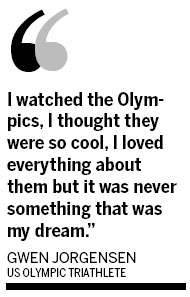
|
Triathlete Gwen Jorgensen poses during the USOC portrait shoot at Smashbox West Hollywood on Nov 18, 2011 in California. Harry How / Agence France-Presse |
Overnight star is ready to break US gold medal drought in one of sport's most grueling events.
Not long ago Gwen Jorgensen was more focused on climbing the corporate ladder than scaling an Olympic podium. A college graduate and chartered accountant, it was 2009 and time to get on with a promising business career. Time to start pounding the pavement in search of work and stop chasing sporting dreams.
Recruiters knocked on Jorgensen's door but they were more impressed by her academic performance than results accumulated in a decorated but unspectacular athletic career as a swimmer and runner at the University of Wisconsin.
Among the group of headhunters, however, was former Olympic triathlete Barb Lindquist, who was intrigued by Jorgensen's well-rounded athletic resume.
A member of the Wisconsin swim team for three years before switching to track and cross-country where she was an All-American in both, Jorgensen's skill set convinced Lindquist that she had potential to win an Olympic medal in an event the United States has surprisingly had little success in.
"She has that Type-A goal-orientated personality and to have the swim run combination from college is kind of unique," Lindquist, who heads the USA Triathlon Collegiate Recruitment Program, said.
"The swim gets you in the game but it's the run that's going to win the game and her run is the best of the triathletes in the world."
Initial hesitation
When first approached, Jorgensen expressed little interest, telling Lindquist, "Thanks, but no thanks".
Her grasp of the sport was limited to a passing curiosity of the grueling Ironman, and the idea of putting herself through that type of torture held no particular appeal.

The Olympic dream was one Jorgensen never really had and she was already started down a promising career path with a job at accounting firm Ernst & Young.
"I didn't really know much about triathlon and it just wasn't something that interested me," said Jorgensen. "I had full-time job lined up and I was just kind of excited to get on with that portion of my life at the time.
"It's strange, growing up I never dreamed about going to the Olympics ... I watched the Olympics, I thought they were so cool, I loved everything about them but it was never something that was my dream."
Despite initial hesitation, Jorgensen went from triathlon debutant to an Olympic medal threat in months, not the punishing apprenticeship it typically takes an athlete to break into the elite and challenge for podiums.
In a sport that places a premium on paying your dues, the 25-year-old American was an overnight success story.
Jorgensen competed in her first triathlon in March 2010 and 17 months later produced a bit of "Gwen-sanity" when she came from nowhere to claim a spot on the US Olympic team with a second-place finish behind Britain's Helen Jenkins on the same course that will be used for the London Games.
"Her ascension has been rapid, perhaps Gwen-Sanity is a good analogy," conceded USA Triathlon CEO Rob Urbach. "She has a fantastic run background a real good swim background.
"She'll be one of the fastest, if not the fastest, runner in the field."
Medal drought
A strong swimmer and naturally gifted runner, Jorgensen has speed to burn in those two legs of the race but is playing catch-up on the bike.
Growing up, Jorgensen says she never owned a road bike and had to be bribed with ice cream by her parents to join them on weekend rides.
"I never owned a bike except one my parents got me in middle school," said Jorgensen. "I brought it to Wisconsin and left it outside my freshman year and the snow ploughs got to it so after that I never even had that bike."
Triathlon's roots are found in France but the US gave the world the modern Ironman version, which gave way to more humane and competitive Olympic distances of a 1.5km swim, 40km bike and 10km run that eased International Olympic Committee fears of competitors dropping from exhaustion.
But the Americans have managed just one medal - a bronze from Susan Williams at the 2004 Games - since the sport joined the Olympic program in 2000.
Urbach believes Jorgensen could be the one to end the country's gold medal drought.
"On paper we should have more," said Urbach. "Some of it is bad luck, variability on the day.
"I'm hoping we will change things up in London."
Reuters in Toronto
(China Daily 03/23/2012 page23)
The mudslide occurred at an iron ore mine in the Araltobe township of Xinyuan county, Ili Kazak autonomous prefecture, a spokesman for the prefecture's fire brigade said.